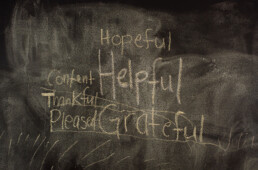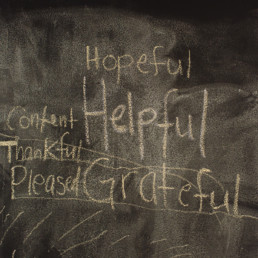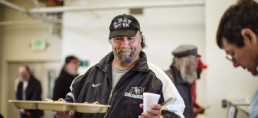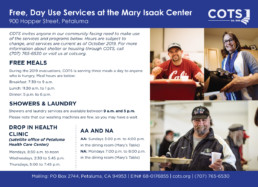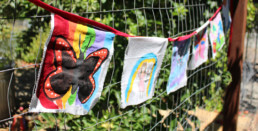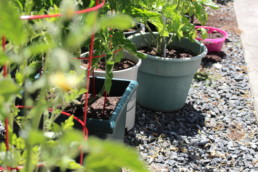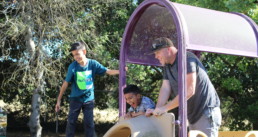The COTS Collective: February 2023
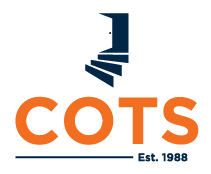

Client Successes Make Our Community Stronger
In the last edition of the COTS Collective, I thanked Chuck Fernandez for his exceptional work leading this organization, and introduced myself as the new CEO. This month, I would like to take an opportunity to highlight a notable client story published in February.
This piece is an exceptional illustration of COTS’ work in the community—providing hope, healing, and support to our most vulnerable community members. While Bradley Brown’s story demonstrates what is possible through community supports and nonprofits like COTS, Brown’s experience with homelessness and the work required to regain self-sufficiency also highlights the complex systems and supports necessary to achieve long-term, positive outcomes.
In the last issue, I wrote about the importance of partnership in addressing homelessness. Brown’s story illustrates this clearly—without partnerships between the City, County, COTS, other nonprofit providers, law enforcement, Brown’s story could have ended much differently. These ongoing partnerships are critical in addressing homelessness now and into the future.
At COTS, we understand that supporting someone on their journey from homelessness to housing can be difficult and long. We also understand that people experiencing homelessness are members of our community—when our clients succeed, our community succeeds.
We are energized by Bradley’s success, and by the success of many other COTS clients just like Bradley Brown. I hope that after reading his story, you are too. Your questions, comments, and suggestions are always welcome here. Thank you for your support.
Until next time,
Chris Cabral
Mission Moment: Improving the Housing-Focused Model
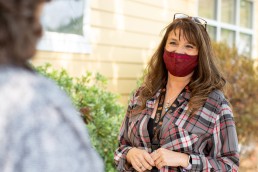
Over the last several months, COTS has implemented a housing-focused model at the Mary Isaak Center shelter. Our goal is to improve self-sufficiency for our clients—with a primary focus on successful placement into long-term, permanent housing.
Staff work one-on-one with clients to create individualized plans, ensuring various barriers facing each client are addressed in unique ways. In the last thirty days, COTS has refreshed its policies related to client enrollment in our shelter, aiming to improve each client’s ability to successfully gain permanent housing while working with COTS.
What does this mean?
Through feedback from people with lived experience and observations of other successful models in the Bay Area, COTS determined that monthly client assessments are an effective way to improve client engagement and increase the effectiveness of our programs.
Each month, Care Managers will work one-on-one with each client to assess progress towards their housing goals over the previous 28 days. We recognize that progress comes in many forms and is rarely achieved in a linear way—each person’s journey from homelessness to housing is unique. For some, progress means applying to jobs, seeing a doctor, or applying for an apartment. For others, progress means improving personal hygiene habits, learning new life skills, or reconnecting with family. COTS is here to support each individual client in their journey to self-sufficiency.
Through monthly assessments, Care Managers and care teams can determine whether a client needs additional services and supports, or whether we may need to alter our approach to better engage a client in setting personal goals and reaching milestones. Think of this process as reviewing a strategic plan—without consistent review and a willingness to pivot, strategy can fail.
Monthly assessments also allow our clients to set both short and long-term goals. Achieving one or more short-term goals each month often provides the motivation necessary for a client to continue their pathway to permanent housing. Celebrating the achievement of short-term goals also creates a bonding moment for clients and Care Managers—a client’s success is a COTS success.
As always, thank you to our advocates, our supporters, and our community for your support of our critical work.
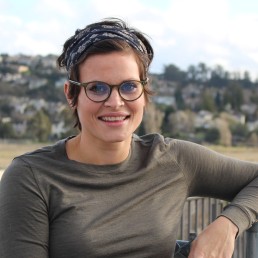
Sincerely,

Chris Cabral, CEO
The COTS Collective: January 2023


Joining the COTS Community
In December, former COTS Chief Executive Officer Chuck Fernandez retired, leaving big shoes to fill. Chuck’s work at COTS left a beautiful legacy full of hope, determination, love, and kindness. I am honored to carry on these traditions in service to COTS and the larger Sonoma County community.
Homelessness is a complex issue—an issue that cannot be solved without community partnership, determination, love, and compassion. As the new COTSChief Executive Officer, I vow to work alongside our incredible team, and promise to ensure COTS remains a prominent ally in ending homelessness in our community.
Here at COTS, we are eternally grateful to bring light and hope to those we serve, and we couldn’t do it without supporters like you. We are inspired by the incredible changes we see within our clients every day, and I am excited to have the great privilege of writing this to all of you.
Please join me in a sincere thank you to Chuck Fernandez for his dedication and compassion, and a hearty cheers to enjoying his retirement.
I am delighted to continue to provide these monthly updates—your questions, comments, and suggestions are always welcome here.
Until next time,
Chris Cabral
Mission Moment: Solutions Through Partnership
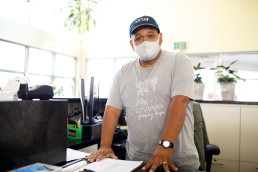
The issue of homelessness did not occur overnight. Permanent solutions take time, resources, and changing strategies to address the evolving needs of our most vulnerable community members. Lasting results demand strong partnerships between service providers, governments, and community members.
We are all part of the broad system of change—without robust partnerships and collective participation, the system fails.
Ask any human services professional about their work and you’re sure to hear words like “burnout,” “frustration,” or any number of synonyms for “tired.” This work is critical, and this work is hard. People in this field are dedicated, compassionate, and demonstrate a “do what it takes” attitude toward their collective mission.
Providers are asked to solve complex human issues with too few resources, often resulting in inefficiencies and workforce fatigue. Despite this, what you’ll find in this field are professionals who show up every day ready to ask, “how can I help?”
COTS is not alone in this experience. Our nonprofit partners, government officials, and community supporters understand the complexity and difficulty in addressing deep-rooted societal factors impacting chronic homelessness. This shared understanding means we can address these factors better together, unifying our efforts and expertise to best serve those who need it most.
True partnership is hard. It takes work, requires patience, and insists we listen to proposed solutions with an open mind. True partnership forces us to reflect on what we do well, but more importantly—what we can improve.
Looking forward, COTS is prioritizing and leveraging its partnerships in service to the Sonoma County community. By taking intentional steps to strengthen our partnerships with other providers, government officials, and community members, COTS can continue its legacy of accessible, quality services in our mission to end homelessness.
In the past month, COTS has increased the availability of mobile showers at the Mary Isaak Center by 50%. In addition, COTS has strengthened its existing collaboration with the City of Petaluma to best align strategic priorities, ensuring COTS clients and others without shelter have access to the services they need, when they need them. We are working with other experienced providers to learn new and innovative practices, and to share our best practices in serving this population. COTS, along with the City of Petaluma, is leading a collaborative effort to amend and improve shelter regulations countywide—a welcome change for our clients, staff, and those experiencing homelessness.
We are unrelenting in our pursuit to end homelessness, but we can’t do it alone. Envisioning a healthy, accessible, and prosperous Sonoma County for all—COTS will continue to lead by example by continually strengthening our bonds with existing partners, and welcoming new supporters with open arms.
As always, thank you to our advocates, our supporters, and our community for your support of our critical work.

Sincerely,

Chris Cabral, CEO
Lisa's Story
Eight years ago, Lisa came to the Mary Isaak Center for the first time due to domestic violence.
“When I came here, it was a blessing,” she says. “I was able to focus on healing, plus getting my life in order, because I was dysfunctional before I came here. They helped me to stand on my feet, get my self-esteem back, grow from my experience, and to be able to see that, as a woman, I could step out of it and be a survivor.”
Even then, Lisa was determined to turn her life around. “I ended up volunteering in the kitchen.…I went to school, and then I got a job, got an apartment, and moved out. Rapid Re-Housing helped me from there. And it lasted for a while. This time, I’m back again, not for the same reasons, but for some of the same behavior.”
For many of our clients, breaking the cycle of homelessness takes years of effort. But while Lisa’s setbacks have brought her once more to the Mary Isaak Center, her determination and self-awareness are helping her make a plan to get back into permanent housing. “I’m doing the same thing I did last time, because it worked,” she says.
She’s volunteering again in the kitchen, this time with the support of Executive Chef Janin Harmon, who is encouraging Lisa to get her culinary degree at Fresh Starts Culinary Academy in Marin, where Janin herself is a graduate. “Here, it’s so nurturing,” Lisa says, “and so different from any other place that I’ve really ever been. Because it’s like, you get a lot of love. You get a lot of tough love, but you also get experience from the other staff that has been here and done that.
“It’s a little embarrassing to come in all broken and talk to somebody that has book knowledge, because they really don’t know where you’ve been at. The staff here lets you know, ‘Hey, look, I’ve been there. And you don’t have to feel afraid to let me know what’s going on with you.’ So it’s easier to get a footing and a foundation, to be able to face the world again, with a different perspective, but a stronger character.”
Chuck's Virtual Coffee - September 2022
As COTS’ CEO, each month I take a moment to consider what I want our community to know about our organization and our progress in serving Sonoma County’s homeless. I look forward to sharing these thoughts with you in this Virtual Cup of Coffee – my monthly communique about the business and mission moments of COTS (Committee On The Shelterless).
My best,
Chuck
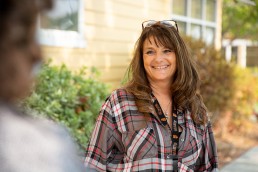
Transitions at COTS
We are going through two major transitions at COTS that will significantly improve how we serve those experiencing homelessness.
The first is our entry into Medi-Cal through the CalAIM program (California Advancing and Innovating Medi-Cal). CalAIM is expanding services available to some of the most vulnerable populations in California, including those experiencing homelessness. The intent is to meet the unsheltered and sheltered where they are – on the streets, in encampments, living in their car, or in a shelter – and then collaborate with health centers to provide services such as enrolling them into Medi-Cal, an appointment with a primary care provider, helping develop a care plan, and hopefully getting them stably housed. California is investing billions of dollars into CalAIM as part of their solution of offering a more equitable, coordinated, and person-centered approach to health care delivery. We are going to serve our clients through a whole new discipline – a medical model.
The second transition is a stronger focus on getting people housed. Thanks to a continued collaboration with our respected partners in Novato, Homeward Bound of Marin, we are moving from a traditional Emergency Shelter to a Housing Focused Shelter. Homeward Bound has an impressive 70% exit rate from their shelters into permanent supportive housing. That means when someone enters our shelter, our expectations are made clear immediately – “you are here to get housing – this is not a free hostel. If that doesn’t work for you, then this is not the place for you.” Then together, we will create a housing plan, and residents will have to meet with their housing case manager weekly. Accountability to their plan is key to staying in the shelter. Getting housing becomes a shared responsibility, but our housing case managers will not work harder than or do all the work for our residents. It’s their responsibility to get housing, and we will help them. This new approach empowers our team, and they are very excited about the possibilities. We are also aligning this new approach with the City of Petaluma’s Strategic Action Plan to End Homelessness and their Pathway to Housing.
We have a responsibility to our community to get people off the streets and into housing. Getting people stably housed is also a big part of their health care plan. And with these two transitions, we believe we can end homelessness.
These transitions won’t be easy. One of my favorite books is by William Bridges called, Managing Transition – Making the Most of Change. Bridges says that change is situational – such as moving offices, restructuring roles, or the retirement of key personnel. Transition, however, is psychological. For any change to succeed, getting people through the transition part is essential. He says that transition is composed of three parts:
- Letting go of the old way of doing things. An ending.
- Neutral zone – when the old is gone but the new way is not yet fully operational or doesn’t feel comfortable. This is also a creative zone where organizations can develop into what they need to become and renew themselves.
- New beginning – coming out of the transition where people develop new identities, experience the new energy, discover a new sense of purpose, and make the change begin to work.
Bridges said that transition starts with an ending and finishes with a beginning. For some on our COTS team, the work they do is personal. A family member, friend, or even they themselves may have experienced homelessness, substance abuse, or mental health challenges. Thus, we cannot impersonally manage the transition and treat it merely as a transaction or change. Sometimes it’s not the change we resist but the ending and having to give up something. We need to be mindful and respectful of the letting go process and the feeling of loss it might create.
Our New CEO
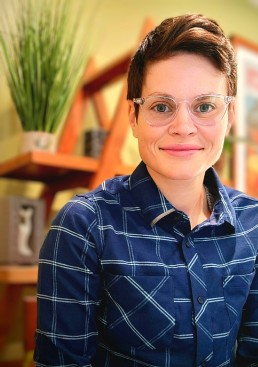
And…we have a third major transition happening at COTS. I am extremely excited about our new CEO at COTS – Chris Cabral. She is wonderful and will help lead COTS to new levels of success – locally and nationally. I was on the search committee and like everyone else, was wowed by her. The committee described her as smart, professional, highly capable with strong leadership skills, dynamic, lots of energy and positivity, humble, vulnerable, and innovative.
The committee was looking for someone that aligned with COTS’s values of integrity, respect, and collaboration. We wanted someone that could build on our wonderful culture, connect with our team members, and listen to and accept them for their strengths. During the interview process when she was asked what her vision was for COTS, she said, “to be the premier partner that people would call upon for help or guidance; and to be the ‘Nike’ of homeless service providers everywhere.” Her references came back glowing. People described her as “in tune with staff, mindful, collaborative, organized and meticulous, follows up, phenomenally intelligent, highly ethical, and does not cut corners.”
Chris starts on January 1, 2023. My last day with COTS will be December 31. I will make myself available to Chris for the month of January. I am also preparing a lengthy CEO Transition Guideline for Chris. WELCOME Chris. We are so excited for you to lead this wonderful organization.

Until next month,

Chuck Fernandez
Volunteer Profile: Katie Haas

When Katie Haas was growing up in San Francisco, kids used to knock on the door and ask if her Dad could come out to play. It might have hurt Katie’s feelings back then, but now she’s grateful for the love of kids and play that her Dad gave her.
She’s shared that love with COTS for over ten years in lots of different ways.
Right now, we think she’s in her perfect role. Katie’s a wonderful artist herself, who works in acrylics and collage, so we’re thrilled to have her as part of the art team at the Kids First Family Center. Once a week, she joins a coordinator from our nonprofit partner Drawbridge to help kids create paintings, sculptures, calendars, light catchers—you name it.
“I’ve loved art since I was little,” Katie says. “It’s been of core importance in my life. I think in our culture we don’t value it as much as we should. I’m glad I can show children that art is something to value and that you can grow from art.”
Katie says she grows from the art sessions, too, and singles out Drawbridge Coordinator Susie Butler as an inspiration. “She knows how to connect with a huge open heart,” Katie says. “I learn from her. She knows the right things to say to make them [the kids] feel self-confident. She’ll compliment them in a really honest way. She just makes them feel seen and loved.”
When not at COTS and not absorbed in her own art-making, Katie has plenty to do, much of with her family. She cares for her aging mom, volunteers with Hospice, helps paint the scenery at Cinnabar Theater, sings in a choir, and, together her husband Al (also a COTS volunteer) produces a small folk concert series in her living room.
Right now, Katie is creating a series of paintings inspired by her father’s childhood class pictures. “They’re from the thirties. I love how in those days you were just who you were in front of the camera. You didn’t smile because you were being photographed like people do today. You smiled because you felt like it. These kids, their expressions, you feel like you could almost read their minds. I feel really connected with them.” Visit katiehaasartstudio.com to feel that connection yourself.
Katie encourages people to give volunteering a try. “Being homeless seems really horrible. I think I just recognize that suffering people need other people. We all like to feel like we’re helping out.”
Thank you, Katie!
Show your support by donating today!
Want to read more stories about our volunteers? Visit our volunteer appreciation homepage by clicking here!
Share Katie’s story with your friends and family:
Volunteer Profile: Tracey Rose

Tracey Rose does a lot of planning and preparation for her art sessions at Kid First Family Shelter.
We have kids of all ages and interests staying with us, and Tracey creates a variety of projects to make their minds jump and their fingers itch. Sometimes, she’ll have a happy crowd in her workshops: joyful, focused kids drawing, pasting and painting.
But the families that stay at the shelter often have challenges around transportation or scheduling. And sometimes a kid will be there, but he’ll want to play a video game—not draw. So, sometimes Tracey will work with a smaller, quieter group.
The last time she came, there was only Angelina, a curly-haired 5-year-old girl who wasn’t sure what she wanted to do with her afternoon.
“I kind of grabbed her,” Tracey says. “’I have lots of fun things’ I told her. ‘Do you want to do art?’” Like a true professional, Tracey gave Angelina a great time. She had three projects with her that day and Angelina chose to make a necklace. Tracey helped her design her pattern, string the beads and secure it around her neck. “She was showing it off. She loved it,” Tracey says.
“But I was feeling disappointed. When you’re planning, you always have an idea of how things are going to go. And this wasn’t it. I wanted more kids.”
Then Angelina asked: “Why do you come here?”
“It was great that she asked me that,” Tracey says. “I thought about it. She made me think about it. And I told her it’s because I love creating art and I love sharing with people. Her smile after that was so big.”
Then Angelina wanted to do more. They made a bracelet for her mom to match the necklace Angelina had made for herself. Her Dad teased and asked where his present was. Tracey and the little girl quickly made him a Valentine’s rock.
“My face hurt I was smiling so hard,” Tracey says. “To be able to give a child something to hang onto, something to create, the opportunity to say, ‘Look what I did and I’m giving it to you,’ that’s wonderful. It lifted her. It made her laugh. What’s better than that?”
We are grateful that Tracey gifts us with her talent, her joy and her flexibility. We are grateful for the lift she provides the kids at COTS—sometimes for many of them, and sometimes for just one precious girl.
COTS kids are not the only ones to benefit from Tracey’s generosity. You can find her reading stories in the children’s area at Copperfield’s once a month. She’s the one who brings in her own stick puppets and her felt board and characters. She’s also a volunteer for Verity, providing outreach education for grade school kids on the difficult topics of staying safe and being body aware. And she volunteers with Marin’s Bread and Roses, shepherding great bands to convalescent hospitals, schools, community centers and shelters.
She and her husband Jeremy are both teachers, but both have had long and varied careers, and Tracey has never been far from a paint brush, sewing machine or paper bead jewelry. They met at Cinnabar Theater in the 1970s. Tracey was starring in “Spoon River Anthology” and her soon-to-be-husband Jeremy was designing and running the lights. By the time the next production was in rehearsal, they’d married. Living in Marin, they raised two talented and “fierce” daughters. They moved back to Petaluma 14 years ago and celebrate their 43rd anniversary this year.
Thank you, Tracey!
Show your support by donating today!
Want to read more stories about our volunteers? Visit our volunteer appreciation homepage by clicking here!
Share Tracey’s story with your friends and family:
COTS Day Use Services for Evacuees
Dear COTS Community,
Please spread the word: Evacuees are welcome to use the Mary Isaak Center, 900 Hopper Street, Petaluma for showers, laundry, meals and phone charging. All services are free.
Showers and laundry services are available between 9 a.m. and 5 p.m. Please note that our washing machines are few, so you may have a wait.
COTS is now also serving three meals a day to anyone who is hungry. Meal hours are below:
Breakfast: 7:30 to 9 a.m.
Lunch: 11:30 a.m. to 1 p.m.
Dinner: 5 and 6 p.m.
Volunteers Needed!
If you’re a regular COTS volunteer, we could use your help coordinating laundry and showers. Please get in touch with the front desk: 707-765-6530 x120.
We would be very grateful for the following donated items to help us serve the community:
• Towels and wash cloths
• Shampoo, body wash
• Bedding/sleeping bags
• Laundry detergent
• Toilet paper
• N95 masks
Thank you to everyone in our community who is pitching in to help those who have been evacuated due to the fires. Thanks especially to our first responders who are keeping us safe. Together, we are proud to be Sonoma Strong!
COTS September Newsletter: Going green and keeping kids safe

Sow success with the COTS Hour Seed Fund
Every year in November, we host The COTS Hour: a huge fundraiser where we gather with our community and share stories of hardship, resilience, and triumph. This year, The COTS Hour will be held at 8 a.m., November 14 at the Petaluma Veterans Memorial Hall. We’re expecting 450 people to attend and raise funds in support of our vital programs and services throughout the year.
We wish we could host all of Sonoma County at The COTS Hour, but we know many of you can’t join us because you’ll be out of town or clocking in to work. This year, you can help before the event by giving to The Seed Fund. Your support demonstrates our community’s investment in our neighbors experiencing homelessness – and encourages our guests to give generously on November 14!
Join us and help us continue this crucial work: click here to donate to The Seed Fund and launch your fundraising page today!
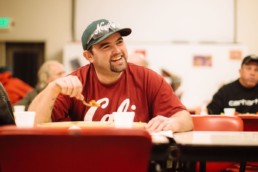
Saving the planet one free meal at a time
What does our work at Mary’s Table have to do with global environmental health? Quite a bit!
About 35 percent of all food in the United States never gets eaten—at a huge cost: a greater need for agricultural land; gallons of precious water wasted; and greenhouse gas emissions that went for nothing.
But thanks to all the food donations we use each year at Mary’s Table, 98 tons of perishable food go into people—not landfills. And those scraps that we don’t use go into animals or into compost. Many thanks to Recology for helping us develop a robust composting program.
We couldn’t feed our guests without the support of many, many food providers, including our local grocery stores and farmers.
And our volunteers are absolute climate heroes. They coax every delicious, usable bit out of our fruits and vegetables.
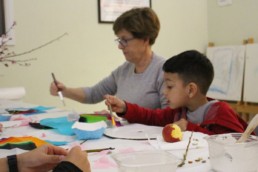
Healthy development happens when kids are safe
Here are a few good bits of news from our Kids First Family Shelter.
“Eddie” clings to his grandmother. She’s his anchor in the world. At school, he couldn’t sit down at his desk without his grandmother by his side, couldn’t make it through the rest of the day once she’d said her goodbyes. After moving into KFFS and finding the stability it provides, Eddie is starting to feel more confident. Two weeks ago, he walked into his classroom all by himself and stayed the entire day. We predict he’ll be able to ride the school bus on his own soon.
When “Valerie” arrived at the shelter, she was shy and wasn’t using speech the way other kids her age do. Today, although no one would call her a chatterbox, she’s begun to relax at the shelter, to come out of her shell, and to speak more. Your support helps give all our kids at KFFS the space to breathe and to feel safe again. Thank you for investing in Sonoma County’s next generation!

Housing lets us breathe
There are few words tenants dread more than, “We’re selling the house.” That’s because those words are usually followed by “And you’re going to have to move.”
Six tenants in COTS’ shared Integrity Housing program recently heard both phrases. Their landlords had rented to the Integrity Housing program for six years at a very affordable price, but they had reached the conclusion that they had to sell the home.
COTS had to deliver 60-day notices to move to all the formerly homeless tenants. We let them know that we’d try our best to find them new housing within the program, but that we couldn’t make guarantees.
The residents are in their 50s, 60s and 70s. Only one resident brings in income greater than $1,000 per month. All of them have severe and painful health challenges.
“I couldn’t breathe or focus when we got the notice,” one resident said. “I just kept thinking, ‘I am too old to be out on the streets again.’”
“I had no options,” said another. “I didn’t know what to do.”
A husband and wife who live together in the house were preparing for the possibility that they might need to split up—that there might be space and rent money enough for only one of them.
“We were working on housing plans,” said COTS Case Manager Debbie Robbins. “Those were some tough discussions.”
We were determined not to lose hope. COTS had received a grant from the Finley Foundation in 2018 to purchase a house, and we realized we now had an incredible opportunity: if we could buy the property before it went on the market, we could keep our clients housed and generate income to support COTS’ programs for the long-term.
With the help of the Finley Foundation, the generous sellers, and our amazing community, we closed on the house on August 30, 2019! We are so grateful to the following partners and businesses who made this happy ending possible:
-
- the Finley Foundation, which provided funding for the purchase.
- the sellers, Dennis and Terry Merrill, who worked with us in the same of spirit of ease. cooperation and generosity that characterized all their business dealings with us.
- Bonnie Merrill, a local realtor and past COTS volunteer, who connected us with Dennis and Terry in the first place – and helped bring them into the Integrity Housing program.
- Dan and Rene Foppe of DNR Pest Control, who donated the necessary pest inspection.
- Terry Lewis of North Coast Inspection, who donated his inspection services.
- Rebuilding Together Petaluma, which is going to help us with repairs and upgrades on the property. (Sign up to volunteer at rtpetaluma.com/volunteer!)
- and Bill Gabbert and Karl Bundesen of Century 21 Bundesen who negotiated the sale and donated all their fees.
With the addition of the house to our permanent Integrity Housing portfolio, we will be able to house clients in Petaluma long into the future. We could not have done it without so many generous community members pitching in to help us make it happen.
“I hope people will see this as a model for providing affordable housing,” said one resident.
Richard Stark, a COTS client and a long-time Petaluma resident whom people might remember from his days playing piano at Copperfield’s, says that he remembers many afternoons chatting with Mary Isaak in her backyard back in the early 1980s. “We were talking about a way forward for humanity,” he said, “about saving the world.”
Mary went on to co-found COTS with her friend Laure Reichek and the help of thousands of supporters.
“I didn’t know it then,” Richard said, “but she really did it. She saved people. And her work saved my life.”
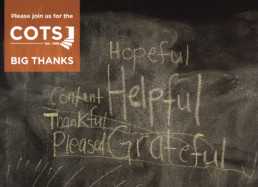
Please join us at The Big Thanks
We can never thank you enough for your support.
But we’d like to try!
Please join us at The Big Thanks at 7 p.m. on Tuesday, October 15 at the Petaluma Woman’s Club.
We’ll show you how we put your support into action—what your donations, your volunteer hours, your advocacy accomplish. And we’ll enjoy great music from Hannah Jern-Miller as well as good company, food and drink.
We are so grateful to you for your support. Thanks to you, COTS can now provide the supports to keep over 400 people in permanent housing annually and 140 people in shelter on any given night.
This is a free event. Please RSVP by clicking here!
COTS August Newsletter: Backpacks, bounty, and Business in the Ballroom
Styled for school success
Many thanks to the Petaluma Valley Rotary and the Active 20-30 Club of Petaluma for getting our kids excited about going back to school. New backpacks, school supplies, shoes and clothes help kids feel like they fit in. That’s especially important for the kids in our programs who have often experienced a lot of upheaval and are starting out as “new kids.”
Petaluma Valley Rotary is supplying brand new backpacks stuffed full of supplies and the Active 20-30 Club is taking kids shopping for school clothes. Together, their efforts will mean a better start to the school year for all COTS’ kids and families!
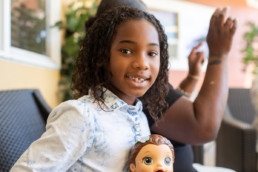
Investing in our children
Sonoma County has invested heavily in Rapid Re-Housing—a program where short-term rental assistance is paired with services to help homeless families stabilize quickly, and soon, shoulder their household expenses independently.
There are good reasons for that investment. According to a 2015 study, five families can be stabilized through rapid re-housing for the same price it takes to house one family in a transitional housing program. We’re finding that study to ring true here in Sonoma County. On average, COTS will pay about $6,000 in rental support to our Rapid Re-Housing landlords as our clients get back on their feet. And over 90 percent of our clients remain housed once our assistance ends.
In our last fiscal year, which ended June 30, we housed more than 200 people through Rapid Re-Housing.In the month of July, 2019, we housed 45 additional people through Rapid Re-Housing.
Wise and efficient use of our limited resources is good for the entire community. And the beautiful thing is that it’s best for our families, too. Nothing is more disruptive for a child than a period of prolonged homelessness.Permanent housing correlates to better health, better academics and a more successful adulthood.
Thanks to all our supporters for investing in COTS’ life-changing programs and services.
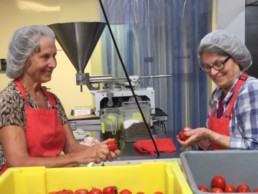
Feeding a crowd and caring for the planet
Over half of the produce grown in the United States goes to waste, according to the Journal of Consumer Affairs of the National Resource Defense Council. Part of the waste comes down to aesthetics: we just won’t buy it if it’s not sleek and pretty.
But anyone who gardens knows that wonky fruits and vegetables taste just as good as their more elegant counterparts. And anyone who’s been to Mary’s Table knows that we are always on the look-out for fresh produce. We serve over 7000 meals a month, and we’ve pledged to fill each one of them with fresh fruits and vegetables.
Preserve Sonoma Farm Kitchens, The Center for Spiritual Living and Jacobs Farm Del Cabo just helped us with that pledge.
Merrilee Olson owns and operates Petaluma’s Preserve Sonoma Farm Kitchens and she’s dedicated her life to using the whole harvest. Merrilee secured a donation of 780 pounds of organic tomatoes from Jacob’s Farm Del Cabo in the Santa Cruz area. Then she enlisted the help of her fellow congregants at the Center for Spiritual Living in Santa Rosa to turn those tomatoes into 600 jars of marinara sauce for Mary’s Table.
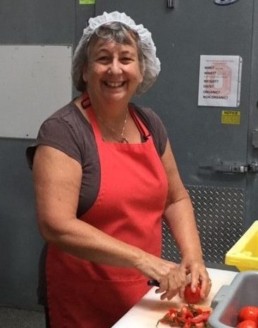
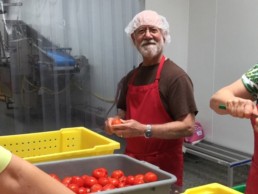
Last Saturday, the volunteers donned hair nets and close-toed shoes and persevered through heat, noise and technical difficulties to create beautiful jars of sauce that we’ll serve at Mary’s Table and give away to residents in our housing programs.
The Center for Spiritual Living chose COTS as a beneficiary of its 2019 charitable giving. Congregants were eager to do even more, Merrilee says. “I put out the word that I needed volunteers and people came.” Merrilee had eight volunteers from the Center helping her and one paid staff member.
Jacobs Farm del Cabo was one of California’s first certified-organic farms. “At Jacobs Farm del Cabo we recognize the unsustainability of food waste and are proud to donate fresh organic produce to community organizations like Mary’s Table,” says Marketing Coordinator Wylie Bird.
According to waterfootprint.org, it takes 26 gallons of water to produce a pound of tomatoes, so using these 700 pounds of tomatoes that would have gone to waste is ensuring thatover 18,000 gallons of water were used well.

Thank you to everyone involved in this heroic effort! When we take care of each other, we can also take care of the planet.
Reminder to all our supporters: Mary’s Table, 900 Hopper Street, is open to the public free of charge for lunch and dinner. Hours are 11:30 a.m. to 1 p.m. and 5 to 6 p.m. every day. Please help us get the word out to anyone who is struggling to make ends meet.
Business in the Ballroom and Picnic in the Parking Lot
Thank you to everyone who came to Business in the Ballroom on July 25 at the Hotel Petaluma. We were thrilled that so many people came out to recognize and commend our incredible business supporters!
Many thanks to the people and organizations who made the event possible: the Hotel Petaluma; the Petaluma Area Chamber of Commerce; Side Dish; Jackson Family Wines; Lagunitas Brewing Company; and Century 21 Bundesen. Thanks to Joy Regan for her lovely photos.
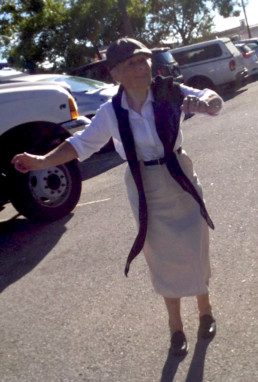
COTS co-founder Laure Reichek celebrating at the COTS Community Picnic
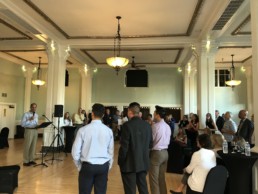
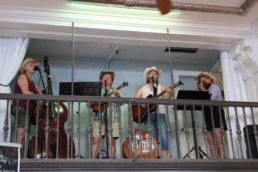
Thanks also to everyone who came to our COTS Community Picnic on July 11 to celebrate the expansion of our free meal program. Now, in addition to our regular lunch offering, our dinners are open to anyone in the community who is having trouble making ends meet. There’s no paperwork involved. Our stalwart volunteers serve lunch between 11:30 a.m. and 1 p.m. and dinner between 5 and 6 p.m.
Restaurants to the rescue!
Two of Petaluma’s finest restaurants have each taken over a meal slot at Mary’s Table. McNear’s restaurant is preparing and delivering Thursday evening dinners and Seared is delivering Monday lunches. These generous deliveries will supplement the meals prepared by our volunteers and staff on other days of the week and give our clients a taste of Petaluma’s best.
Together with his wife Carrie, owner Ken O’Donnell delivered and served the first meal on Thursday: baked chicken with a garlic glaze, pesto pasta and vegetables. What a treat! Thank you!


Client profile: Don
The urge to beautify our surroundings is universal. For Don, for many years, his design space was limited to his walking stick, a craggy piece of 100-year-old Eucalyptus. He pressed into the wood his mother’s birthstone, a ring from a happy period of his life, stones and talismans, each representing births and deaths and friendships.
Don’s childhood in Sonoma County was rough, he says. He joined the military and discovered a mechanical aptitude. He worked a variety of jobs but fell into homelessness when one personal tragedy followed another and another. He camped and couch-surfed and occasionally stayed in shelters. He prided himself on keeping a clean and tidy campground. That all changed when a driver making an illegal turn sent Don flying off his bike. He landed yards away with bruises, a concussion, and multiple broken ribs and limbs. The driver fled, never to be seen again.
Still convalescing, he entered our Permanent Supportive Housing program ten months ago. He shares a mobile home with another gentleman and works with case manager Kathleen Sinnott. She helps him get to his medical appointments and wade through the paperwork from his accident.
Don still has the walking stick, but, now, his mobile home is his canvas. Boxes and cans line the kitchen shelves in artistic displays; just-plumped pillows perch on the couch; animal figurines pose together on the television; in the garden, sun catchers surround his thriving tomato plants.
“I just like things nice,” he says.
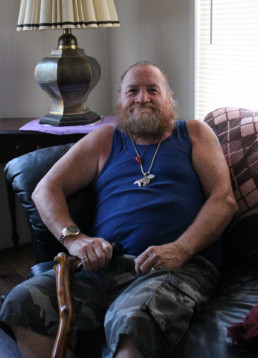
COTS July Newsletter: 195 Moving Days!
Rapid Re-Housing Update
Now that COTS’ fiscal year has ended, we are thrilled to share this year’s Rapid Re-Housing numbers. Since July 1, 2018, 195 people, including 82 children, have found housing and support through our program.
What is Rapid Re-housing? It’s a relatively new approach to homeless services, a state and federal “best practice” informed by a body of research indicating that moving individuals experiencing homelessness into housing quickly – rather than having them endure long stays in a shelter – benefits the interests of both those individuals and the broader community. With a home, people are much better able to take care of their health, increase or stabilize their incomes, and stay clear of trouble. The benefits that a stable home brings to a child is even more pronounced: academic, social and emotional outcomes skyrocket once children are stably housed. The benefits to our clients translate to reduced healthcare and other public sector costs for the broader community. (Read more about our Housing First approach here.)
As part of our Rapid Re-Housing program COTS is able to provide time-limited financial assistance and supportive services to clients transitioning out of homelessness. The idea is to find housing that they’ll be able to afford once on their own once our support ends.
Supportive services help our clients achieve that self-sufficiency and can include help with a job search or with job skills-development, linkage to childcare, healthcare or other services. The services we provide are tailored to each family’s needs and desires.
We are grateful to the many funders who make this program possible: all our COTS supporters, the Redwood Credit Union Community Fund, the Tipping Point Community fund, the County of Sonoma, and the City of Rohnert Park.
We look forward to reporting more on our 2018-19 results soon.
School’s out!
School’s out and the community is stepping up to help COTS’ kids have a great summer.
At our Kids First Family Center, we have arts, crafts, stories, soccer, and science experiments courtesy of a bevy volunteers, including Nick Harris, Marie Schmittroth, Tracy Rose, and people from Drawbridge and the Petaluma Library.
Kids at Vida Nueva, our permanent supportive housing program in Rohnert Park, are journeying out to Wish Fulfilling Tree Ranch in Sebastopol once a week for six weeks to work with therapy dog Ziggy, a delightful black lab, and Ziggy’s co-therapist, Shanti Hill-Gauer (pictured right).
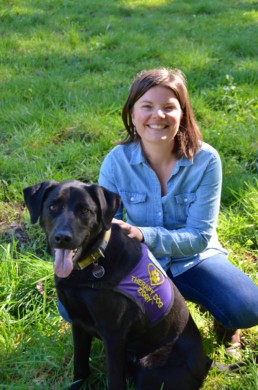
Shanti is a licensed clinical social worker and is an expert in animal-assisted therapy. In addition to having a blast, the kids are learning new skills while they get to know Ziggy and each other—skills like healthy boundaries setting, effective communication, teamwork, and leadership.
Kids in Integrity Housing are having adventures at sleep-away camp! One awesome young woman graduated from camper last year to counselor this year—a paying job that allows her to mentor younger kids and help them find their voices and explore their talents and interests.
Our generous donors fund these enrichment programs. Thank you to everyone who’s stepped up!
Upcoming Events at COTS

Please join us for a free picnic at the Mary Isaak Center, Thursday, July 11 to celebrate the expansion of our community meals program.
For years, thanks to your support, we’ve been able to provide three meals a day to our residents and lunch to anyone who is struggling to make ends meet. This month, we were able to expand the program and have opened dinners to the larger as well. Now, we’re able to to reach people who are working or studying during the day, offering a nutritious evening meal to anyone who’s hungry.
Your support made it possible for us to qualify for the anonymous funding to expand the program. Please join us to celebrate between 5:30 and 7:30 p.m., July 11, at 900 Hopper Street. We’ll have live music from the Rivertown Skifflers and special crafts and activities for kids. Everyone is welcome to Mary’s Table for fried chicken, sides, and a glass of lemonade — with special thanks to Petaluma Poultry and Preferred Sonoma Caterers.
Please RSVP at cots.org or call Jamieson Bunn at 765-6530 x 100.
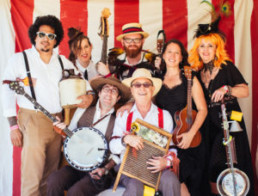

COTS likely wouldn’t have made it through its first year if it weren’t for the support of our local businesses. A timely donation from Clover, important contributions from Copperfield’s, Petaluma Market, Lace House Linen, and many other companies made all the difference back in 1988. And we never would have made it through the next 29 years if that support had not continued – and grown. We count on local businesses for consistent support but also to respond quickly when government funding priorities change abruptly, or when need becomes particularly acute.
Help us celebrate our generous businesses at a free Chamber of Commerce After Hours from 4:30 to 6:30 p.m., Thursday, July 25, in the Hotel Petaluma Ballroom. Side Dish provides the music, Anna B’s Kitchen provides the snacks, and some of our best local makers provide beer and wine.
The event is also your first opportunity to purchase tickets for the greatest raffle drawing of the year. The Realtors® and support staff at Century 21 Bundesen collaborate with local restaurant owners to provide exquisite dining packages to give away as raffle prizes—all to benefit COTS. Last year’s raffle raised $20,000 to support our programs and services, and this year’s prizes look better than ever. Join us on July 25 for your first chance to win!
To learn more, contact Eileen Morris at 765-6530 x 128.
Finally at home
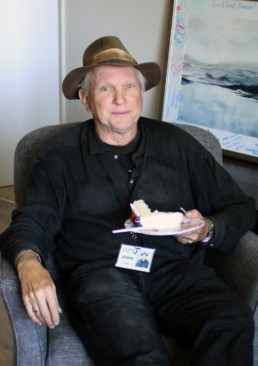
In May, we shared the story of our client Dennis, who was recently approved for an affordable senior apartment. We are excited to report that Dennis moved into his new apartment on his birthday in June. Here he is enjoying a little cake in his comfy chair after spending the better part of an hour on the phone with PG and E (a classic rite of passage for every new renter!). The same day he moved in to his new apartment he was back to volunteer in the kitchen, serving our residents.
“Dennis left something here with me,” Mary Isaak Center resident Reggie told us today. “He taught me to persevere. I’m not going to get discouraged.”
Thank you to everyone who responded to our request to help Dennis furnish his apartment. Your donations enabled us to provide him with a bed, kitchen utensils, and a place to sit and read after a long day.
Have an item you wish to donate? Visit our website to find out more.
Enduring Commitments
Henrietta Heyman and Betty Louise “Belu” Jones lived lives of service and civic engagement. Both women had long careers in education and social services. Henrietta, who died at age 102, worked in munitions during World War Two. They were both singers, harmonizing through the 60s with Petaluma’s Les Chansonettes. Belu was a sculptor, active in the Petaluma Arts Council. Both Henrietta and Belu found time to support many causes, including COTS and the Petaluma Library.
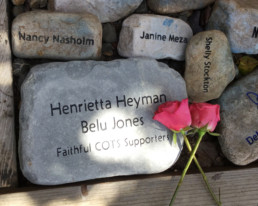
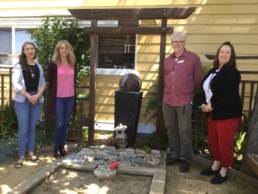
Their support didn’t end after death. Through their wills, these two friends made a huge contribution to ending homelessness in Sonoma County. We are grateful they chose COTS as their instrument. Together with Joe Cochrane from the Petaluma Library, we met recently to place a stone in our memorial garden, honoring Henrietta and Belu.
Our peaceful garden memorializes the clients we’ve lost as well as our important supporters—all are joined together in the garden and in our hearts.
Thank you, Henrietta and Belu.
You can find out more about gifts to COTS that endure here.
Passion Projects
To benefit COTS, sixth-graders Ryan and Anais made and sold one-of-kind art pieces. Fourth-grade “Go Girls,” Taylor and Ava baked and sold cookies, cakes and pies. The staff at Bay Alarm held a yard sale. Blue Door Yoga held a meditation event. Brandon dedicated his birthday. Terra Firma Realty donated a percentage of their fees. The Birdhouses for COTS group decorate and sell miniature bird houses at the east side farmer’s market. Kay DeMartini hosts a story-telling event, “Long Story Short,” the second Friday of every month at Griffo Distillery.
Those are just a few of the fundraisers people have put on for COTS in recent weeks.

We love win-wins around here. You can support COTS while doing things that are fun and social or while you’re learning new skills or sharing your talents. And by sharing your love of COTS with your community, you help us sustain and expand our programs – helping more individuals, families, and children move out of homelessness to a permanent home.
For more information about fundraising for COTS, please visit Become a COTS Fundraiser.
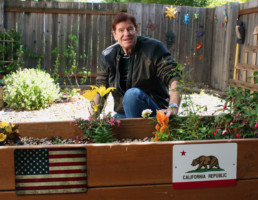
Dennis
You can’t count on kindness paying off, but it’s awfully nice when it does.
Dennis was an old hand at camping by creek sides—unnoticed much of the time—when he met an elderly brother and sister who weren’t as skilled. They had no tent, just sleeping bags and scattered bags of possessions out in the open. Dennis came upon them one day as they were on a pedestrian bridge, feeding ducks. “They were green,” Dennis says. “They didn’t know what they were doing.”
He offered them a place at his campsite and helped them get a tent. The trio looked out for each other and kept each other company. Soon, Dennis extended an invitation to another man and their neighborhood was complete. They kept their camp clean and drug free, Dennis says.
Then the brother and sister met Cecily Kagy, COTS Outreach worker. Within a few weeks, she helped them move into a rental.
Cecily had learned about Dennis from the brother and sister she’d helped. Now it was his turn. “I was on the street for eight years,” Dennis says, “and Cecily was the only person who ever approached me to say, ‘I want to help you.’”
“I was hesitant at first,” he says. “I figured it wasn’t going to go anywhere. I figured I’d probably die on the streets.”
It was a belief that made sense. Dennis had lost his rental housing in Petaluma when he was 57, after a long career installing dry wall. 40 years of repetitive use injuries, a bad case of arthritis and a nonwork-related fall that broke his hip and several other bones left him unable to work for long stretches. He camped, mostly, with short stints in shelters or motels. He worked through a temp agency when he could, but he could never save enough to get ahead. When he turned 62 he was eligible for Social Security, but that didn’t provide him enough to save for move-in costs and rent.
Cecily arrived at an opportune time.
He needed to go to court, where the District Attorney was proposing two years’ probation for a camping ticket. Cecily drove him to the Court House, and during a break in the proceedings, they talked about Dennis’ resources and hopes.
In the next days, they got busy. Dennis met Cecily at a Starbuck’s to fill out a housing application. She helped him prepare for his interview. By the time his next court date rolled around, a room had come open in COTS Integrity Housing program and he’d been approved. “When they heard that I had a place lined up, they dropped the charges,” Dennis says. “If it hadn’t been for Cecily, I’d still be homeless and I’d be on probation.”
Now, days away from his 65th birthday, Dennis shares a home with three others. The rent is a stretch—about half of his monthly income—but adds up to less than what he spent on the four or five hotel stays per month he paid for to shower and clean up.
After he spent one uncomfortable night on a twin bed, Cecily helped find him a queen-sized bed, which is a better fit for his six-foot-seven frame.
“The calm, the relaxed way you feel: that’s the biggest difference. I don’t go to sleep afraid that someone’s going to wake me up yelling, ‘Police. Exit the tent with your hands showing.’ I can walk home from the store and I don’t have to watch my back wondering if someone is going to see where I live and rob me or harass me.”
Free from the grind and all the tasks of camping, Dennis is just getting a feel for how to spend his days. One of the last things he did before he moved in was to talk with the other man at his campground, a veteran who’d resisted meeting Cecily. “He found out I was moving,” Dennis says, “and he said, ‘Tell her I’m interested.’”



